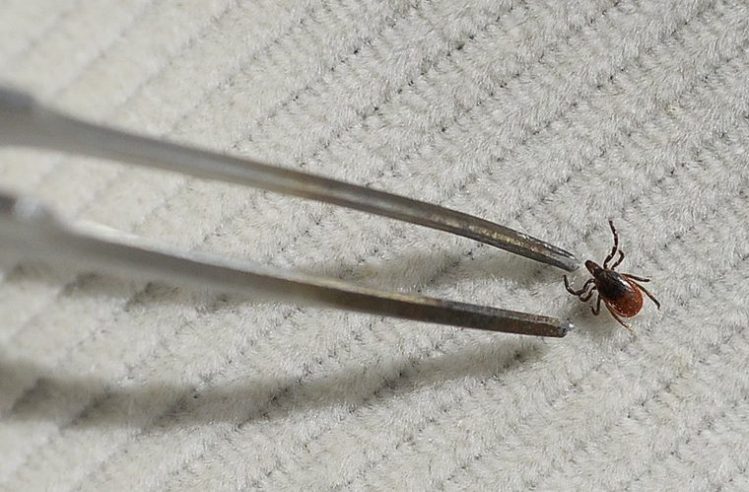Two midcoast Maine residents recently contracted a rare virus transmitted primarily through deer tick bites, prompting state officials to urge Mainers to be cautious and vigilant while outdoors.
The Maine Center for Disease Control and Prevention said Wednesday that it had been notified about two cases of the Powassan virus, sometimes called the deer tick virus. Both people were hospitalized with encephalitis in late April but have since been released and are recovering.
“Powassan, although rare, can be serious so it is important to be aware of your surroundings and take steps to avoid being bitten by ticks,” state epidemiologist Dr. Siiri Bennett said in a statement. “Ticks are found in wooded and bushy areas so use caution if you go into these areas.”

Powassan is fatal in about 10 percent of cases, according to the U.S. Centers for Disease Control and Prevention.
Griffin Dill, an integrated pest management professional with the University of Maine Cooperative Extension, said ticks are becoming more and more a part of life in Maine.
“We’ve created the right conditions for them to be prevalent and, because it’s Maine, we’re out there with them,” he said. “We don’t want people to be afraid to go outside. It’s just something to be aware of so we can take precautions.”
Dill runs the extension’s tick ID program, too. He said he’s analyzed about twice as many tick submissions this year as he had at this time last year.
Most people associate ticks with Lyme disease, which is a far more common infection. Symptoms of Lyme disease include fever, headache and fatigue, and many people develop a rash that resembles a bull’s-eye around the bite. Most people recover with antibiotics, but if left untreated, the infection can cause arthritis and other severe problems.
Last year, the number of Lyme disease cases in Maine reached an all-time high of 1,464. Other tick-related illnesses – including anaplasmosis and babesiosis – saw dramatic increases last year as well.
Those illnesses are all bacterial and can be treated.
But Powassan, which is viral, is far more rare and virtually impossible to treat. Since 2000, the state has identified just nine confirmed cases of Powassan virus, including the two recent cases. Nationally, only 75 cases have been confirmed in the past 10 years, according to the federal Centers for Disease Control and Prevention.
“There is no actual cure or treatment that stops the infection,” Dill said. “Treatment comes down to treating the symptoms with the hope that with time the body can fight it off.”

Marilyn Ruth Snow
That doesn’t always happen. In 2013, a well-known artist from Thomaston died after contracting the virus.
Marilyn Ruth Snow was bitten by a tick while walking and became ill. The 73-year-old woman grew weak and developed a high fever and meningitis before lapsing into delirium, becoming paralyzed and requiring a ventilator to breathe. She died about a month later.
Powassan is fatal in about 10 percent of the cases, according to the U.S. Centers for Disease Control and Prevention, although doctors and hospitals are not required to report the illness to federal authorities.
The virus is transmitted to humans through the bite of infected ticks. Symptoms can include: fever, headache, vomiting, weakness, confusion, seizures and memory loss. Long-term neurological problems are a risk as well.
The state said residents and visitors can take steps to protect themselves from tick bites. They include: wearing protective clothing; using an EPA-approved repellent; avoiding heavily wooded or brushy areas; and performing daily tick checks.
The University of Maine Cooperative Extension office also offers free tick identification. More information is available on its website: https://extension.umaine.edu/ipm/tickid/.
Eric Russell can be contacted at 791-6344 or at:
Twitter: PPHEricRussell
Send questions/comments to the editors.




Comments are no longer available on this story